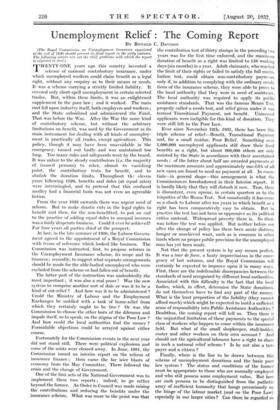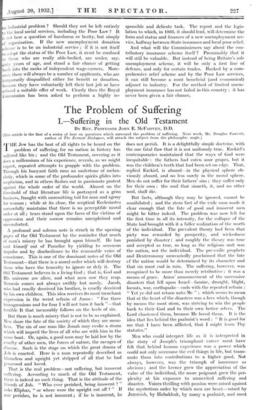Unemployment Relief : The Coming Report
BY RONALD
C. DAVISON (The Royal Commission on Unemployment Insurance appointed at the end of 1930 should present its final report in the early autumn. The following article sets out the chief problems with which the report is expected to deal.) TWENTY-ONE years ago this countrj invented a scheme of national contributory insurance, under which unemployed workers could claim benefit as a legal right, without any enquiry as to their means or needs. It was a scheme carrying a strictly limited liability. It covered only short-spell unemployment in certain selected trades. But, within these limits, it was an enlightened supplement to the poor law ; and it worked. The main cost fell upon industry itself, both employers and workers ; and the State subsidized and administered the Fund. That was before the War. After the War the same kind of contributory scheme, but without the arbitrary limitations on benefit, was used by the Government as its main instrument for dealing with all kinds of unemploy- ment in practically all trades, except agriculture. This policy, though it may have been unavoidable in the emergency, turned out badly and was maintained too long. Too many rules and safeguards went by the board. It was unfair to the steady contributors (i.e. the majority of insured persons) to relax, almost to vanishing point, the contributory tests for benefit, and to abolish the duration limits. Throughout tin eleven years following 1920, benefits and doles (at equal rates) were intermingled, and to pretend that this confused medley had a financial basis was not even an agreeable fiction.
From the year 1926 onwards there was urgent need of reform. But to make drastic cuts in the legal rights to benefit and then, for the non-benefitted, to put an end to the practice of adding equal doles to unequal incomes was a fairly desperate business. Could it ever be achieved? For four years all parties shied at the prospect.
At last, in the late summer of 1980, the Labour Govern- ment agreed to the appointment of a Royal Commission with terms of reference which looked like business. The Commission was instructed, first, to propose reforms in the Unemployment Insurance scheme, its scope and its finances; secondly, to suggest what separate arrangements should be made for the able-bodied unemployed who were excluded from the scheme or had fallen out of benefit.
The latter part of the instruction was undoubtedly the most important ; it was also a real poser ! Was the new system to comprise another sort of dole or was it to be a kind of out-relief ? And how was it to be administered ? Could the Ministry of Labour and the Employment Exchanges be saddled with a task of home-relief from which they certainly ought to be free ? Or was the Commission to choose the other horn of the dilemma and impale itself, so to speak, on the stigma of the Poor Law ? And how could the local authorities find the money ? Formidable objections could be arrayed against either course.
Fortunately for the Commission events in the next year did not stand still. There were political explosions and some of the mists were cleared away. In June, 1931, the Commission issued an interim report on the reform of insurance finance ; then came the far icier blasts of economy from the May Committee. There followed the crisis and the change of Government.
One of the first acts of the National Government was to implement these two reports ; indeed, to go rather beyond the former. An Order in Council was made raising the contributions and reducing the benefits under the insurance scheme. What was more to the point was that the contribution test of thirty stamps in the preceding two years was for the first time enforced, and the maximunl duration of benefit as a right was limited to 156 workini!, days (six months) in a year. Adult claimants, who reached the limit of their rights or failed to satisfy the full contri- bution test, could obtain non-contributory payments only if, in addition to complying with the ordinary condi- tions of the insurance scheme, they were able to prove to the local authority that they were in need of assistance. The local authority was required to apply its public assistance standards. That was the famous Means Test, properly called a needs test, and relief given under it was termed Transitional Payment, not benefit. Uninsured applicants were ineligible for this kind of donation. They were still left to the Poor Law.
Ever since November 12th, 1931, there has been this triple scheme of relief—Benefit, Transitional Payment and, for a small residue, Poor Relief. Something over 1,000,000 unemployed applicants still draw their fixed benefits as a right, but about 900,000 others are only assisted by the State in accordance with their ascertained needs ; of the latter about half are awarded payments at the maximum amounts and approximately one-fifth of all new cases are found to need no payment at all. In essen- tials—in general shape—this arrangement is what the Commissioners foreshadowed in their Interim report. It is hardly likely that they will disturb it now. True, there is discontent, even uproar, in certain quarters as to the iniquities of the Means Test. Not unnaturally it has come as a shock to Labour after ten years in which benefit as a right has been comparatively easy to obtain. But in practice the test has not been so oppressive as its political critics contend. Widespread poverty there is. So there was before the test was applied. But neither before nor after the change of policy has there been acute distress, hunger or unrelieved want, such as is common in other lands where no proper public provision for the unemployed man has yet been made.
Not that the present system is by any means perfect. It was a tour de force, a hasty improvisation in the emer- gency of last autumn, and the Royal Commission will certainly be expected to improve upon it in many ways. First, there are the indefensible discrepancies between the standards of need recognized by different local authorities. Associated with this difficulty is the fact that the local bodies, which, in effect, determine the State donations, do not themselves have to find any part of the money. What is the least proportion of the liability (they cannot afford much) which might be expected to instil a sufficient sense of responsibility into Public Assistance Authorities ? Doubtless, the coming report will tell us. Then there is the unjustified limitation of these payments to the special class of workers who happen to come within the insurance field. But what of the small shopkeeper, stall-holder, coster and other workers on their own account ? And should not the agricultural labourer have a right to share in such a national relief scheme ? Is he not also a tax- payer and a citizen ?
Finally, where is the line to be drawn between this scheme of unemployment donations and the 'basic poor law system ? The status and conditions of the former must be appropriate to those who are normally employed and who still possess some employment value. But how are such persons to be distinguished from the pathetic army of inefficient humanity that hangs precariously on the fringe of the labour market (and on the Poor Law) especially in our larger cities ? Can these be regarded as an industrial problem ? Should they not be left entirely to the local social services, including the Poor Law ? It , not here a question of harshness or laxity, but simply of organization. If the new unemployment donation scheme is to be an industrial service ; if it is not itself to adopt the status of the Poor Law, it must be confined to those who are really able-bodied, are under, say, sixty years of age, and stand a fair chance of getting back into the ranks of independent wage-earners. More- over, there will always be a number of applicants, who are temporarily disqualified either for benefit or donation, because they have voluntarily left their last job or have refused a suitable offer of work. Clearly then the Royal Commission has been asked to perform a highly re- sponsible and delicate task. The report and the legis- lation to which, in .1933, it should lead, will determine the form and status and finances of a new unemployment ser- vice, halfway between State insurance and local poor relief.
And what will the Commissioners say about the con- tributory insurance scheme itself ? Presumably that it will still be valuable. But instead of being Britain's sole unemployment scheme, it will be only a first line of defence, and only for certain trades. Backed by a com- prehensive relief scheme and by the Poor Law services, it can still become a most beneficial (and economical) adjunct to industry. For the method of limited unem- ployment insurance has not failed in this country : it has never been given a fair chance.































 Previous page
Previous page